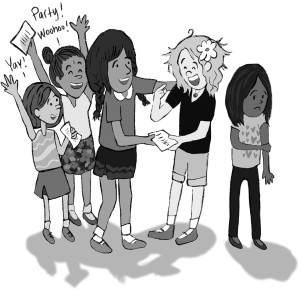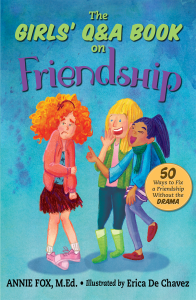|
|
August 21, 2015
 “Why doesn’t she want to be my friend anymore?” Today’s question comes from the mom of a 12-year-old who is feeling her daughter’s pain at being rejected by a long-time bff.
How can I help my daughter deal with rejection? Her friend of six years has a new best friend. My daughter is hurt and desperately trying to win her friend back. What can I do to help her accept that sometimes friends move on?
Rejection comes up a lot in life, so we get lots of practice dealing with it. Either we didn’t get chosen for the team or didn’t get into the school we wanted or didn’t get the job we interviewed for. These are as “institutional” rejections. They sting, but at least they are not truly personal. This 12-year-old is grappling with a very personal form of rejection, being ditched by a close friend who has moved on into the embrace of a new bff. Ouch!
When we talk to our kids about feelings of rejection it’s important to give them a chance to talk about it. “I feel bad! What did I do wrong? Why doesn’t she want to be my friend any more?!” These aren’t necessarily questions that require answers from you. A child asking these questions is most helped by a parent who listens with compassion and patience and understanding. But when this girl talks to Mom about “trying to win her friend back” that is when a parent ought to do more than listen and empathize.
The daughter seems to believe she can change her friend’s mind. Mom can help by providing a reality check (compassionately, of course). Mom needs to tell her there are certain things in life that we can control and certain things we can’t. In the area of what we can’t control: the thoughts, feelings and behavior of other people. In the area of what we can control: our response to what’s going on inside and out.
If someone were to kick me in the shins, I’d yell “Ow!” because it hurt. If someone says, “I don’t want to be your friend” that’s going to hurt, too. But how long will it hurt? And how many times will I play over in my mind those hurtful words? If I’m a healthy, resilient child or adult, I won’t replay it much. Why re-hash something when the hash didn’t taste great to begin with?
Talk to your children about the concept of re-hashing negative thoughts and mental movies. Then say to your child, “Sweetheart, you already have what it takes to be a good friend. You were Emma’s best friend for six years! And that is a great accomplishment. But friendships don’t always last forever.” Now would be a good time to remind your child of the friend she was close to in preschool or third grade who, now in sixth grade, is no longer a close friend. That might help her understand the evolution of feelings and friendships.
My best advice for helping children dealing with rejection:
a) Let kids express how they feel without your interrupting, correcting, or invalidating those feelings.
b) Prompt kids to think and talk about what, if anything, they might have done to contribute to the rejection. Relationships are a two-way street and it’s good for them to acknowledge what they might have done or failed to do to keep the friendship healthy and strong.
c) Brainstorm with kids about how they might respond next time they are rejected. It’s important for them to recognize they always have options in the way they behave.
d) Encourage them to think about a candidate who might become their next best friend.
These conversations will empower your child. It will also strengthen your bond and help your child become more resilient.

July 30, 2015
 What’s wrong with you? Can’t you take a joke?! For better or for worse, our tweens and teens spend immeasurably more time with their friends than we did at their age. UOK wid dat? If we allow it, digital access enables them to connect every waking hour. These interactions strengthen interpersonal skills as often as they undermine them. Our kids must learn to set boundaries with other kids so they’ll develop confidence in who they are and what they need in a relationship.
Today’s question comes from a parent whose 10-year-old daughter has two challenging friendships.
Friend A says things to my daughter that undermine her confidence (“Everyone knows your writing sucks.”) but then laughs it off as a joke. Friend B is very sweet and kind, but too clingy. She always wants to do whatever my daughter does. Are there phrases she could use to help her tell the bitchy chick to change or go away, and to tell the lovely friend to be more independent?
– Frustrated Mom
Setting boundaries is something we all have to learn, because we need to teach people how to treat us. When we stay silent in the face of insults or we laugh along with the people mocking us, we send this message: “It’s OK for you to put me down.” Since that’s not the message your daughter wants to send, she needs to speak up for herself.
When Friend A makes nasty comments then hides behind “Just kidding!” your daughter needs confidence to let the girl know she just “crossed the line.” Ah, but how?
Many girls equate challenging a friend with being “mean” and that’s part of the reason they avoid “confrontations.” Make sure your daughter understands this isn’t a confrontation, it’s a respectful communication. Let her also know that standing up for herself (or others) doesn’t make her “mean” it makes her brave.
Advise your girl to stay calm and strong while she makes eye-contact, and simply speaks the truth. She might say something like this to Friend A: “That didn’t feel like ‘kidding’ to me. It hurts. If you’re really my friend, you won’t do that again.” Now Friend A has been put on notice and your daughter has taken back her power. If your daughter needs help saying these words, role play with her until she feels ready for the conversation. Hopefully this will work. If Friend A continues to make cutting remarks, then your daughter will have to continue standing up for herself and/or find the EXIT to this friendship.
In the case of “too clingy” Friend B… that’s a bit trickier. Your daughter has the right to choose who she spends time with but she doesn’t ever have the right to intentionally hurt anyone. (Remind her how it feels to be on the receiving end of one of Friend A’s zingers.) But that doesn’t mean she must continue to allow herself to be smothered in her clingy friend’s embrace. She might say something like this to Friend B: “I like spending some time with you but not all the time. I want to spend time with other friends, too. So today, let’s hang out together during lunch recess. Then tomorrow I’m going to hang out with Friend C.” That’s a clear communication and it is sensitive and respectful. Friend B may not be happy to hear that she won’t be with your daughter tomorrow, but if your daughter stays calm and delivers the message clearly and confidently, Friend B will (eventually) figure out that she needs to widen her friendship circle.

March 17, 2015
Morning walks with The Pupster reveal more and more free stuff in the neighborhood. Curbside boxes filled with coffee mugs (“Kalua!”), anemic Christmas cacti, Danielle Steele novels, rusty tools. (Be still, my heart!) Horray for spring cleaning. I should race down to my own garage and thin out the flotsam and junksam, but I’d rather be blogging.
 My best friend doesn’t love me anymore! Though yesterday, I did a bit of feng shui. In my SENT BOX, I found a dust-covered Hey Terra letter from 2002. (Thank god, I answered it promptly, thirteen years ago.) I have no idea why I hung on to this one. I’ll take it as a sign it should be posted, if for no other reason than to give me permission to delete it and to show that when it comes to girls’ friendship issues, some things don’t change.
Hey Terra,
My best friend of five years has just decided to end our friendship.
She claims that I constantly destroy her self-esteem. I always try to support her, and tell her how wonderful she is. I am usually there to pick up the pieces after she is hurt by others. So I don’t understand why she’d accuse me of things I have never done. She also claims that we don’t get along anymore. This is the first spat we’ve had in five years. She never allowed the friendship to push through the disillusionment/spat to actually cultivate a more meaningful relationship. She just ended it.
She seems to lean towards friendships that really have no depth.
She always has to be the leader of the group. Another thing, she
never has any passion for anything in her life (except her own
wants). She cannot see past herself. She tends to separate
herself from people who actually have passion in their life.
She never listens either. I just do not understand why she would be
like this, and why she refuses to listen to anyone. Doesn’t a close,
five-year relationship mean anything to her? She wasn’t even
willing to try to work at it!
Thanks,
Curious
Dear Curious,
From what you describe it sounds like you and your friend expect very
different things from a friendship. You seem to be looking for a
“meaningful” relationship that goes beyond the surface. You think of
yourself as someone who has passion for things and you clearly
don’t admire the fact that she “never has any passion for anything…
except her own wants.” You describe your friend as a person who needs
to be in control and tends to be self-centered and “never listens to
anyone.” From your words, she doesn’t sound like much fun to be around.
Yet, in spite of all these differences, which have clearly been obvious to you for a while, you still call this a “close” relationship. That makes me “Curious” too! Is
this a real friendship or a 5-year habit that you might be interested in breaking?
Think about it.
In friendship,
Terra
Meanwhile, back in 2015…. How might we do a better job teaching our girls there are standards in friendships and that it’s smart to evaluate relationships with an eye toward what you want and need? If it turns out that your daughter is not happy in a friendship, encourage her to discuss it (privately and respectfully) with her friend. If that doesn’t result in positive changes, let’s teach our girls to find the EXIT so they can get more of what they deserve from someone else. Your thoughts?

December 20, 2014
T’is the season for parties. When it’s a family affair, all the kids are included. But as you get older, you may want to organize your own get-togethers, and that means only “special friends” get invited. If you’ve been left off a party invitation list you might have felt left-out. But what if you were invited to a party and one of your besties wasn’t? Awkward situation!
This question comes from a girl who found herself in that situation. Her question and my answer are included in my latest book, The Girls’ Q&A Book on Friendship: 50 Ways to Fix a Friendship Without the DRAMA. Read on…
 “I got invited, but my friend didn’t! Awkward!”
Q: “Friend A invited everyone to her party except Friend B. Now Friend B is mad at me for wanting to go. But I need to go so I can be popular. Is it worth it?”
Answer: If understand that you want to go to the party, but if everyone was invited except Friend B, you can understand why she is upset. Maybe you can also understand why she is angry that you want to go without her.
When you say, “I need to go to the party so I can be popular,” I wonder if the Popularity Game means more to you than Friend B. People who ditch friends to be with more “popular” people often find themselves without any real friends.
Should you go to the party? Good question! If you do, then Friend B will probably be unhappy with you. She might get over it, but there is also a chance that your going to the party could really damage the friendship. You are the only one who can decide if it’s “worth the risk. To help you figure it out, think about this: If Friend B go invited and you didn’t, how would you feel about her going with you? If it wouldn’t feel right for her to go, then it’s probably not right for you.
_______
If you’re curious about the 49 other questions and answers in The Girls Q&A Book on Friendship, check out this free excerpt. If you’ve got a friendship challenge you need help with right now, email me or post it to the comments below.
 50 Ways to Fix a Friendship without the DRAMA
 — Older Posts »
| |
















